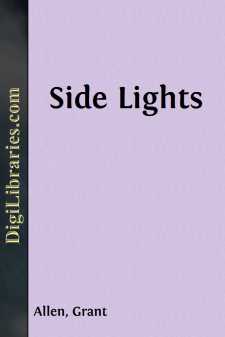Categories
- Antiques & Collectibles 13
- Architecture 36
- Art 48
- Bibles 22
- Biography & Autobiography 813
- Body, Mind & Spirit 142
- Business & Economics 28
- Children's Books 17
- Children's Fiction 14
- Computers 4
- Cooking 94
- Crafts & Hobbies 4
- Drama 346
- Education 46
- Family & Relationships 57
- Fiction 11829
- Games 19
- Gardening 17
- Health & Fitness 34
- History 1377
- House & Home 1
- Humor 147
- Juvenile Fiction 1873
- Juvenile Nonfiction 202
- Language Arts & Disciplines 88
- Law 16
- Literary Collections 686
- Literary Criticism 179
- Mathematics 13
- Medical 41
- Music 40
- Nature 179
- Non-Classifiable 1768
- Performing Arts 7
- Periodicals 1453
- Philosophy 64
- Photography 2
- Poetry 896
- Political Science 203
- Psychology 42
- Reference 154
- Religion 513
- Science 126
- Self-Help 84
- Social Science 81
- Sports & Recreation 34
- Study Aids 3
- Technology & Engineering 59
- Transportation 23
- Travel 463
- True Crime 29
Side Lights
by: Grant Allen
Categories:
Description:
Excerpt
I.
LETTER-WRITERS.
Since old Leisure died, we have come to think ourselves altogether too fine and too busy to cultivate the delightful art of correspondence. Dickens seems to have been almost the last man among us who gave his mind to letter-writing; and his letters contain some of his very best work, for he plunged into his subject with that high-spirited abandonment which we see in "Pickwick," and the full geniality of his mind came out delightfully. The letter in which he describes a certain infant schoolboy who lost himself at the Great Exhibition is one of the funniest things in literature, but it is equalled in positive value by some of the more serious letters which the great man sent off in the intervals of his heavy labour. Dickens could do nothing by halves, and thus, at times when he could have earned forty pounds a day by sheer literary work, he would spend hours in answering people whom he had never seen, and, what is more remarkable, these "task"-letters were marked by all the brilliant strength and spontaneity of his finest chapters. He was the last of the true correspondents, and we shall not soon look upon his like again. With all the contrivances for increasing our speed of communication, and for enabling us to cram more varied action into a single life, we have less and less time to spare for salutary human intercourse. The post-card symbolises the tendency of the modern mind. We have come to find out so many things which ought to be done that we make up our minds to do nothing whatever thoroughly; and the day may come when the news of a tragedy ruining a life or a triumph crowning a career will be conveyed by a sixpenny telegram. In the bad old days, when postage was dear and the means of conveyance slow, people who could afford to correspond at all sat down to begin a letter as though they were about to engage in some solemn rite. Every patch of the paper was covered, and every word was weighed, so that the writer screwed the utmost possible value for his money out of the post-office. The letters written in the last century resembled the deliberate and lengthy communications of Roman gentlemen like Cicero: and there is little wonder that the good folk made the most of their paper and their time. We find Godwin casually mentioning the fact that he paid twenty-one shillings and eightpence for the postage of a letter from Shelley; readers of The Antiquary will remember that Lovel paid twenty-five shillings postage for one epistle, besides half a guinea for the express rider. Certes a man had good need to drive a hard bargain with the Post Office in those pinching times! Of course the "lower orders"—poor benighted souls—were not supposed to have any correspondence at all, and the game was kept up by gentlemen of fortune, by merchants, by eager and moneyed lovers, and by stray persons of literary tastes, who could manage to beg franks from members of Parliament and other dignitaries. One gentleman, not of literary tastes, once franked a cow and sent her by post; but this kind of postal communication was happily rare....






















